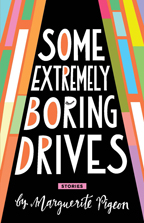Some Extremely Boring Drives
By Marguerite Pigeon
NeWest Press
214 pages; $19.95
Reviewed by Traci Skuce
There’s a propulsion to the narratives in Marguerite Pigeon’s Some Extremely Boring Drives that’s anything but boring. Attribute this to Pigeon’s strong yield of language and voice, her ability to cut a clear and quirky character, and her deft hand at developing uncanny situations.
Vancouver-based Pigeon, a former radio and television journalist, is versatile. She has previously published a novel, the political thriller Open Pit, and a book of poems, Inventory, which was nominated for the Gerald Lampert Award. Some Extremely Boring Drives is her first short story collection.
“Endurance,” the opening story, plunks the reader into the strange and icy world of an Arctic cross-country race. Like other characters that populate this collection, Annick is motivated by getting “as far as possible from weakness”, and must confront her own callous heart when she stumbles across a fellow racer in trouble. In “Torera”, the thirty-one year old, Sheridan, unwillingly travels to Spain in order to flee her overbearing forty-five year old-pregnant-mother. In “Power Out”, Nicole is forced on a long march down Yonge Street during the Toronto blackout, navigating the dark and her own secret.
Throughout the collection Pigeon investigates how our mobile culture impacts the psyche. For example, Melanie in “Backup” is happy on the road, enjoying her life as a backup singer for “transfers between places, the requirement of alarm clocks, transportation, a strict rehearsal schedule, and the exhausting shows. On the other hand, returning from a routine team building regime in “An Overnight Business Trip”, Peter recognizes how blase he’s become about travel. Not only are the air plane and hotel “standardized”, so is the way he interacts with others. He doesn’t have anything to hide, but is afraid of stepping on any of a dozen invisible social field mines.
There’s often an incongruity between what Pigeon’s characters feel, what they want to feel and what they present to the world. She does this particularly well in the experimental story “Makeover” where the narrator bumps into her “other self”, a doppelganger-her life set on a different path, one with a baby. The story is full of thwarted expectations:
“In stories, meeting oneself is supposed to be like that. Something important. Corrective or horrific. But nothing was happening. I had met myself. She had a baby. I wore a mask of cosmetics. She seemed short-fused. She had questions. So did I.”
But those questions don’t get asked. And here’s where Pigeon’s work is strongest, when she pushes the narrative into the unexpected, arriving at a deeper, more compelling knowing.
After a brief fisticuffs with her alternate self, the narrator notices she used to “hide an inner battle against too much feeling. . . I shuddered at this insight; I’d never before understood how much people could know just by watching you sit and think.” This mirrored experience leads to her to a new and frightening uncertainty, she’s “no longer sure how to judge what I was putting into the world through my face or body.”
The final story, “The Woman on the Move” pays homage to Kaftka’s “The Hunger Artist”, and is its modern equivalent, replete with sponsorships and motivational speeches, exploring movement in its extreme, as art and sacrifice. The perfect end to this dynamic, never boring, collection.
Traci Skuce is a writer based in the Comox Valley. She recently completed her MFA at Pacific University, Oregon.

{ 1 comment… read it below or add one }
What a powerful book review. Traci Skuce was able to articulate the essence of the stories and brought them back to life for me just from her summaries.She also got the talent and creative ability of Marguerite Pigeon. Bravo!